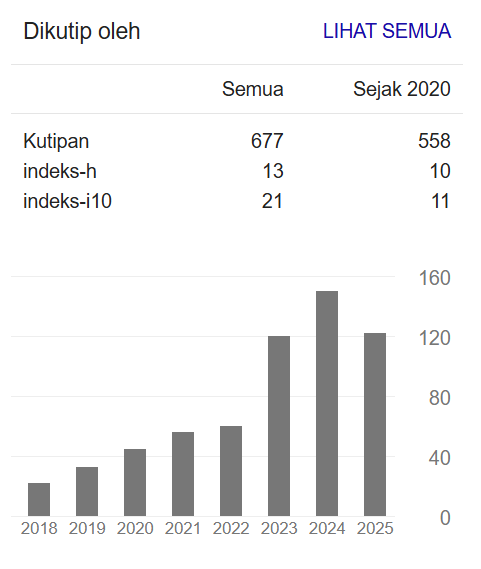A THEMATIC STUDY OF PHILOSOPHY SCIENCE AND METHODOLOGY ON ESCHATOLOGY BASED ON THE AL-QUR’AN AND AL-HADITH TEXT
DOI:
https://doi.org/10.20871/kpjipm.v9i1.261Keywords:
Al-Hadith, Al-Qur’an, Eschatology, Philosophy of Science and MethodologyAbstract
Eschatology is the study of things that exist in life after death (akhirah). The law of studying eschatology is mandatory for every Muslim because its substance concerns the fifth pillar of faith, namely faith on judgment day. The concept and implementation of eschatology studies looked simply, but its impact is not small in daily life. Eschatology has lost its existence in modern science because the depth of its meaning has not been adequately revealed through research methodology. This research aims to explore the substance and meaning of eschatology through a philosophy of science and methodology. The common thread between this research and previous research is that eschatology still boils down to evidence that the judgment day and the resurrection day do exist, and Allah is the only God of the universe. The main sources for writing these thematic studies are the Al-Qur’an and Al-Hadith texts. The research method is a qualitative method. The interdisciplinary study of the philosophy of science and methodology involves aspects like axiology, ontology, and epistemology. The result is that the depth of eschatology meaning has been comprehensively revealed.
Downloads
References
Abdillah, Sukron. 2016. “Eskatologi Kematian dan Kemenjadian Manusia.” JAQFI: Jurnal Aqidah dan Filsafat Islam 1 (1): 121–134. https://doi.org/10.15575/jaqfi.v1i1.1691.
Albani, Muhammad Nashiruddin al-. 2007. Shahih At-Targhib Wa At-Tarhib: Hadits-hadits Shahih tentang Anjuran dan Janji Pahala, Ancaman, dan Dosa. Diterjemahkan oleh Izzudin Karimi. Jakarta: Pustaka Sahifa.
Ali, Muhammad Daud. 2018. Pendidikan Agama Islam. Depok: Rajawali Pers.
Bagir, Haidar. 2005. Buku Saku Filsafat Islam. Jakarta: Mizan Digital Publishing.
Bakhtiar, Amsal. 2001. “Eskatologi dalam Perdebatan Antara Al-Ghazali dan Ibn Rusyd.” Mimbar Agama dan Budaya 18 (4).
Borchert, Donald M. 2006. Encyclopedia of Philosophy 2nd Edition. Vol. 9. Michigan: Farmington Hills.
Bukhārī, Abī ‘Abdillah Muḥammad al-. 2002. Ṣaḥīh al-Bukhārī. Beirūt: Dār Ibn Kathīr.
CNN Indonesia. 2020. “Alasan Mengapa Waktu Cepat Berlalu Saat Merasa Bahagia.” CNN Indonesia. 2020. https://www.cnnindonesia.com/gaya-hidup/20200922121732-284-549340/alasan-mengapa-waktu-cepat-berlalu-saat-merasa-bahagia.
Gayá, Patricia, dan Mary Phillips. 2016. “Imagining a Sustainable Future: Eschatology, Bateson’s Ecology of Mind and Arts-Based Practice.” Organization 23 (6): 803–824. https://doi.org/10.1177/1350508415619240.
Ginting, Jamsen. 2022. “Tatanan Dunia Baru dalam Misi–Kajian Eskatologi.” Journal of Industrial Engineering & Management Research 3 (4): 106–119. https://doi.org/10.7777/jiemar.v3i4.357.
Habibie, Hebi. 2022. “Konsep Kekekalan Akhirat: Komparasi Eskatologi Islam dan Kristen.” SINTHOP: Media Kajian Pendidikan, Agama, Sosial dan Budaya 1 (1): 18–35. https://doi.org/10.22373/sinthop.v1i1.2337.
Ḥanbal, Aḥmad bin. 1995. Al-Musnad al-Imām Aḥmad bin Muḥammad bin Ḥanbal. Kairo: Dār al-Hadīth.
Klein, Julie Thompson. 1990. Interdisciplinarity: History, Theory, and Practice. Ohio: Wayne State University Press.
Latif, Umar. 2016. “Konsep Mati dan Hidup dalam Islam (Pemahaman Berdasarkan Konsep Eskatologis).” Jurnal Al-Bayan: Media Kajian dan Pengembangan Ilmu Dakwah 22 (2): 27–38. https://doi.org/10.22373/albayan.v22i34.875.
Moleong, Lexy J. 2005. Metodologi Penelitian Kualitatif. Bandung : PT Remaja Rosdakarya.
Muliati, Muliati. 2016. “Al-Ghazali dan Kritiknya Terhadap Filsuf.” Aqidah-Ta: Jurnal Ilmu Aqidah 2 (2): 77–86. https://doi.org/10.24252/aqidahta.v2i2.3436.
Narbuko, Cholid, dan Abu Achmadi. 2012. Metodologi Penelitian. Jakarta : Bumi Aksara.
Nazir, Mohammad. 1999. Metode Penelitian. Jakarta: Ghalia Indonesia.
Nurhidayanti, Nurhidayanti. 2020. “Eskatologi dalam Padangan Hassan Hanafi dan Fazlurrahman (Studi Komparatif Epistemologi Ilmu Kalam).” Kontemplasi: Jurnal Ilmu-Ilmu Ushuluddin 8 (1): 104–126. https://doi.org/10.21274/kontem.2020.8.1.104-126.
Nurwahidin, Nurwahidin. 2009. “Memaknai Kembali Eskatologi dan Semangat Etos Kerja Islami.” Humanika, Kajian Ilmiah Mata Kuliah Umum 9 (1): 13–24. https://doi.org/10.21831/hum.v9i1.3780.
Prawiro, Abdurrahman Misno Bambang, dan Ahmad Rifai. 2017. Metode Penelitian Muamalah. Jakarta : Penerbit Salemba Diniyah.
Pridandi, Pirhad. 2023. “Argumentasi Ibnu Rusyd Tentang Eskatologi.” Jurnal Riset Agama 3 (1): 223–235. https://doi.org/10.15575/jra.v3i1.20411.
Pulungan, Syahid Muammar. 2014. “Eskatologi dalam Al-Qur’an.” HIKMAH 8 (2): 114–129.
Qurthubi, Imam Al-. 2004. Buku Pintar Alam Akhirat Edisi Pertama. Diterjemahkan oleh Ahmad Syaikhu. Jakarta: Pustaka Darul Haq.
Rahman, Fazlur. 1980. Tema Pokok Al-Qur’an. Diterjemahkan oleh Anas Mahyuddin. Bandung : Penerbit Pustaka.
Rohman, Abdur. 2021. “Konsep Ayat-Ayat Eskatologi Perspektif Fazlur Rahman.” AL-IFKAR: Jurnal Pengembangan Ilmu Keislaman 16 (02): 4–17. http://ejournal.kopertais4.or.id/mataraman/index.php/ifkar/article/view/4657.
Rushd, Ibnu. 1972. Faṣl al-Maqāl Fīmā Bayna al-Ḥikmah wa al-Sharīah min al-Ittiṣāl. Diedit oleh Muhammad ‘Imārah. Kairo: Dār al-Ma ‘ārif.
Safaruddin, Safaruddin. 2013. “Eskatologi.” Jurnal al-Hikmah 14 (1): 56–64. https://journal.uin-alauddin.ac.id/index.php/al_hikmah/article/view/415.
Supriatna, Rizki Rizki. 2020. “Eskatologi Mulla Sadra: Kebangkitan setelah Kematian.” Jaqfi: Jurnal Aqidah dan Filsafat Islam 5 (1): 101–120. https://doi.org/10.15575/jaqfi.v5i1.6329.
Uthaymīn, Muḥammad bin Ṣāliḥ al-. (2005). Sharhu Lum‘ah aI- ‘Itiqād al-Hādī Ila Sabīl al-Rashād. Damaskus: Mu’assasah Shaykh al-Khayriyah.
Weidner, Daniel. 2022. “Historicism, Religionsgeschichte, and the Rhetoric of Eschatology.” Modern Intellectual History 19 (4): 1191–1207. https://doi.org/10.1017/S1479244321000317.
Zed, Mestika. 2014. Metode Penelitian Kepustakaan. Jakarta: Yayasan Obor Indonesia.
Downloads
Published
How to Cite
Issue
Section
License
Copyright (c) 2023 Muhammad Rizal Hidayat, Mohammad Izdiyan Muttaqin

This work is licensed under a Creative Commons Attribution 4.0 International License.





























